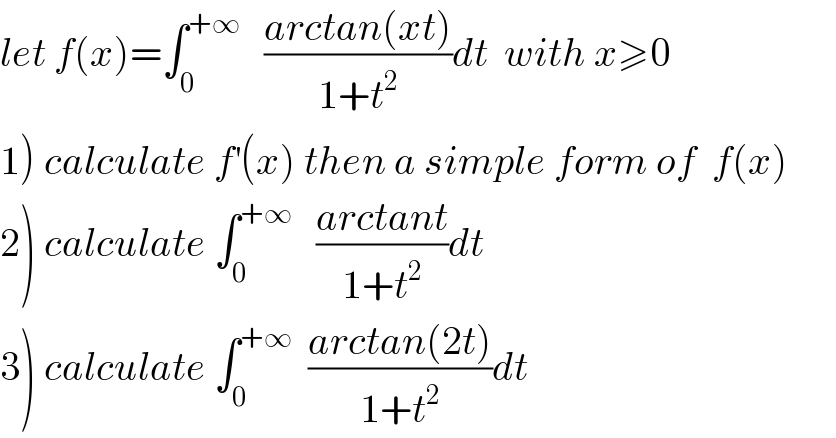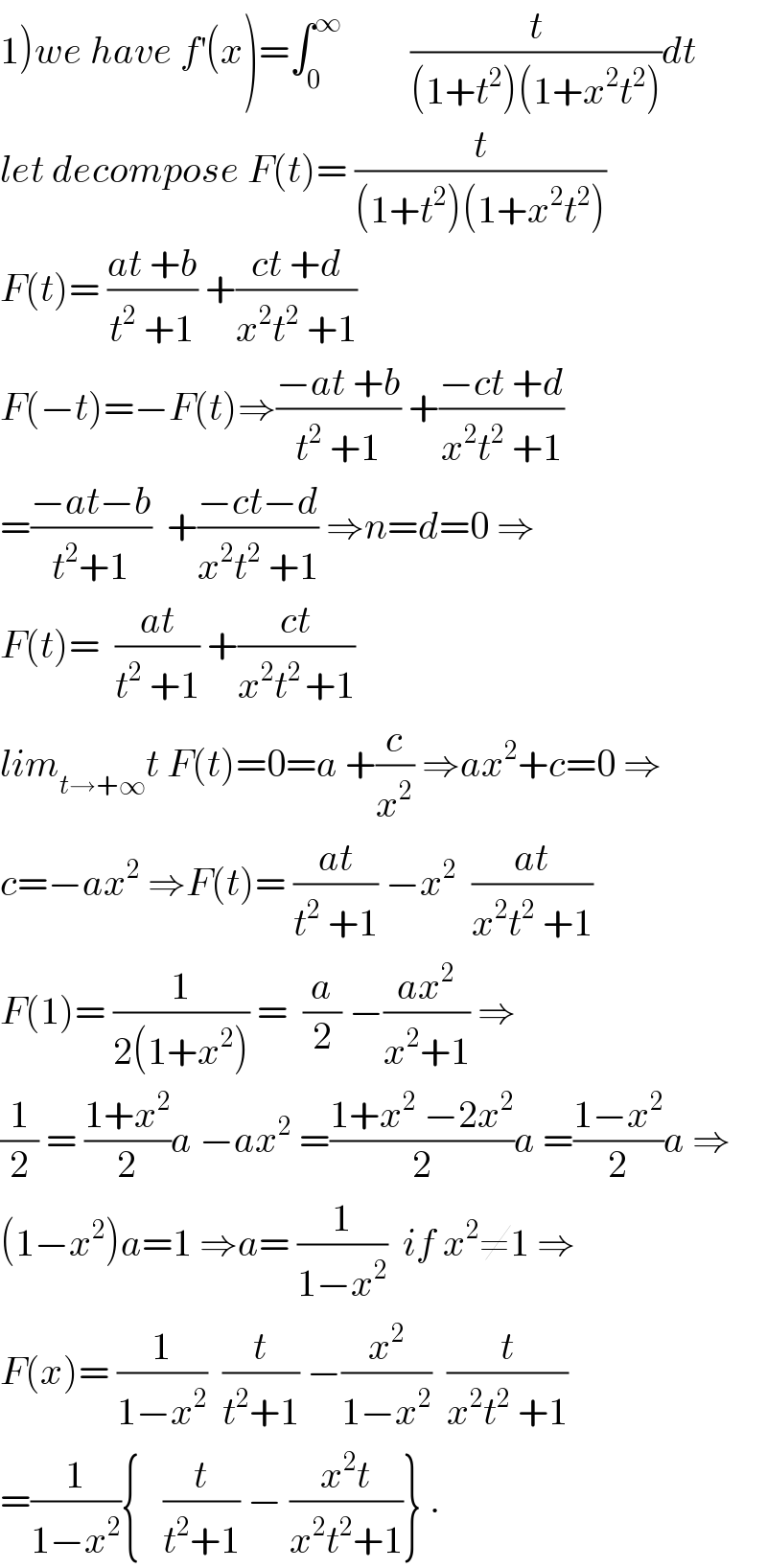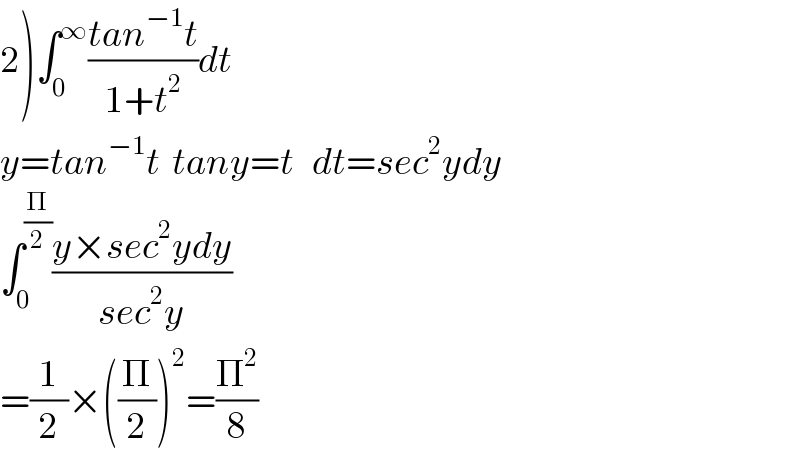
Question and Answers Forum
Question Number 38310 by maxmathsup by imad last updated on 23/Jun/18

Commented by prof Abdo imad last updated on 24/Jun/18

Commented by abdo.msup.com last updated on 24/Jun/18
![f^, (x)=∫_0 ^∞ F(t)dt ⇒(1−x^2 )f^′ (x) = ∫_0 ^∞ (t/(1+t^2 ))dt −(1/2)∫_0 ^∞ ((2x^2 t)/(x^2 t^2 +1))dt =[(1/2)ln∣ ((1+t^2 )/(x^2 t^2 +1))∣]_0 ^(+∞) =(1/2)ln((1/x^2 ))=−ln∣x∣ ⇒f^′ (x)=−((ln∣x∣)/(1−x^2 ))](Q38378.png)
Commented by abdo.msup.com last updated on 24/Jun/18
![for x>0 we get f^′ (x)=−((ln(x))/(1−x^2 )) ⇒ f(x)= −∫_1 ^x ((ln(t))/(1−t^2 ))dt +c c=f(1)= ∫_0 ^∞ ((arctant)/(1+t^2 ))dt changement t=tanθ give f(1)= ∫_0 ^(π/2) (θ/(1+tan^2 θ)) (1+tan^2 θ)dθ =∫_0 ^(π/2) θ dθ=[(θ^2 /2)]_0 ^(π/2) =(π^2 /8) ⇒ f(x)=(π^2 /8) −∫_1 ^x ((ln(t))/(1−t^2 ))dt .](Q38379.png)
Commented by prof Abdo imad last updated on 24/Jun/18
![2) ∫_0 ^∞ ((arctan(t))/(1+t^2 ))dt =(π^2 /8) 3) ∫_0 ^∞ ((arctan(2t))/(1+t^2 ))dt =f(2) =(π^2 /8) −∫_1 ^2 ((ln(t))/(1−t^2 ))dt changement t=1+x give ∫_1 ^2 ((ln(t))/(1−t^2 ))dt = ∫_0 ^1 ((ln(1+x))/(1−(1+x)^2 ))dx =∫_0 ^1 ((ln(1+x))/(1−1−x^2 −2x))dx = −∫_0 ^1 ((ln(1+x))/(x(x+2)))dx =−∫_0 ^1 ln(1+x)((1/x) −(1/(x+2)))dx =−(1/2) ∫_0 ^1 ( ((ln(1+x))/x) −((ln(1+x))/(x+2)))dx =(1/2) ∫_0 ^1 ((ln(1+x))/(x+2))dx −(1/2) ∫_0 ^1 ((ln(1+x))/x)dx but ln^′ (1+x) = (1/(1+x)) =Σ_(n=0) ^∞ (−1)^n x^n ⇒ ln(1+x)=Σ_(n=0) ^∞ (((−1)^n )/(n+1))x^(n+1) =Σ_(n=1) ^∞ (((−1)^(n−1) )/n)x^n ⇒∫_0 ^1 ((ln(1+x))/x)dx=∫_0 ^1 (Σ_(n=1) ^∞ (((−1)^(n−1) )/n)x^(n−1) ) =Σ_(n=1) ^∞ (((−1)^(n−1) )/n^ )∫_0 ^1 x^(n−1) dx =−Σ_(n=1) ^∞ (((−1)^n )/n^2 ) =−(−(π^2 /(12)))=(π^2 /(12)) by parts ∫_0 ^1 ((ln(1+x))/(x+2))dx =[ln(1+x)ln(2+x)]_0 ^1 −∫_0 ^1 ((ln(x+2))/(x+1))dx =ln(2)ln(3)−∫_0 ^1 ((ln(x+2))/(x+1))dx ∫_0 ^1 ((ln(x+2))/(x+1))dx=∫_0 ^1 (Σ_(n=0) ^∞ (−1)^n x^n )ln(x+2)dx =Σ_(n=0) ^∞ (−1)^n ∫_0 ^1 x^n ln(x+2)dx by parts A_n = ∫_0 ^1 x^n ln(x+2)dx =[(1/(n+1))x^(n+1) ln(x+2)]_0 ^1 −∫_0 ^1 (x^(n+1) /((n+1)(x+2)))dx =(1/(n+1)){ln(3) −2^(n+1) ln(2)}−(1/(n+1)) ∫_0 ^1 (x^(n+1) /(x+2))dx ...be continued...](Q38382.png)
Answered by tanmay.chaudhury50@gmail.com last updated on 24/Jun/18

